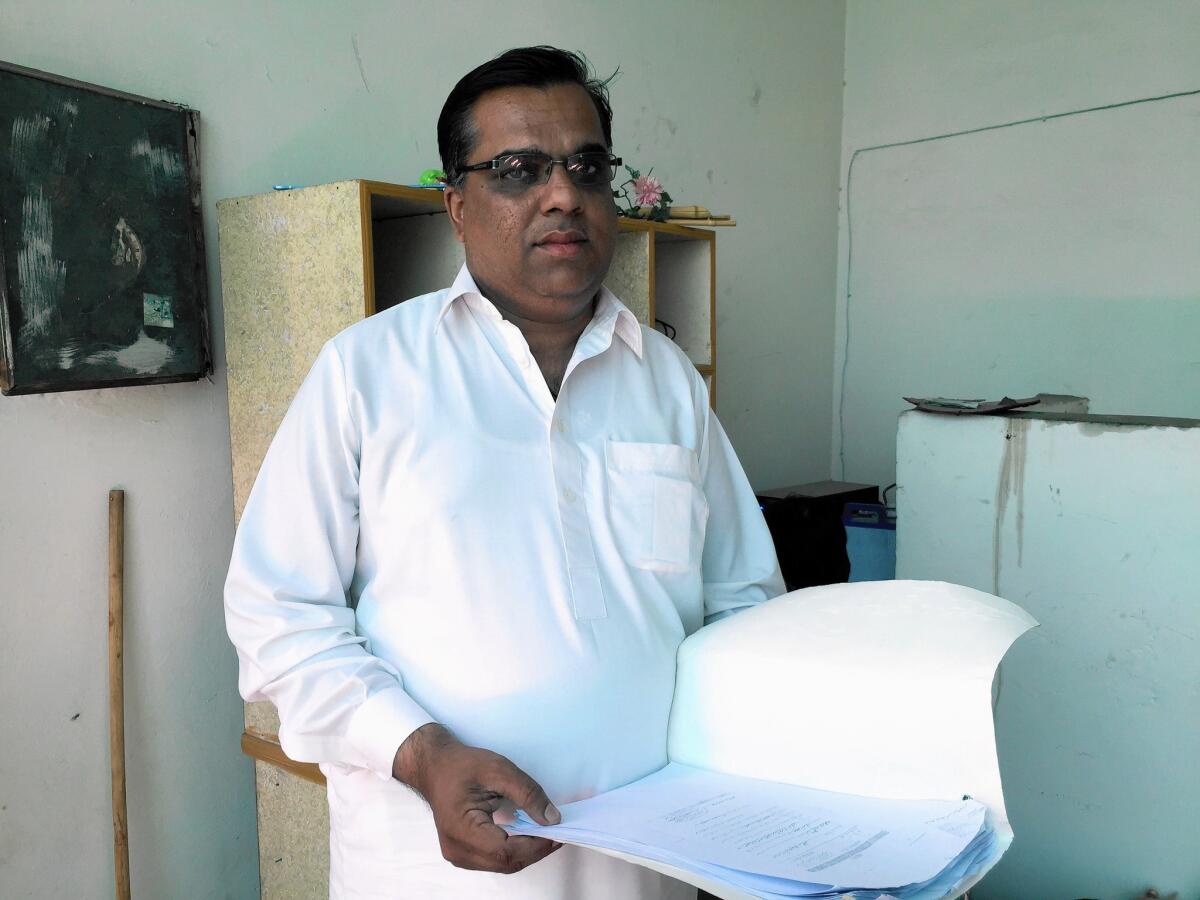In Pakistan, militants raise alarm with their ‘Court of Sharia’

reporting from LAHORE, Pakistan — When a suicide bomb exploded Easter Sunday at a crowded park near his home, killing dozens, Khalid Saeed was saddened but not surprised. Saeed had already seen the reach of Islamist militants firsthand.
This year, a disgruntled former business partner had shown up at the 45-year-old builder’s office and handed him a summons from the “Arbitration Court of Sharia,” a reference to Islamic religious law.
It was printed on the letterhead of Jamaat-ud-Dawa, the political arm of a terrorist organization whose founder has a $10-million U.S. bounty on his head.
After he failed to appear for the hearing at a mosque in Lahore, Saeed said, he began receiving threatening phone calls. Undeterred, he sued the Pakistani government, and last week a judge ordered the Interior Ministry to investigate whether Jamaat-ud-Dawa was running a parallel justice system in the country’s second-largest city.
The group acknowledges operating a religious council to mediate disputes, but denies that it coerces anyone into obeying its rulings.
These goons are controlling Lahore. The government has no authority.
— Khalid Saeed, businessman who challenged Jamaat-ud-Dawa
The legal tussle underscores the influence that extremist groups exert in Pakistan, often right under the government’s nose. Even as the army vows to crack down on Islamist militants it blames for devastating attacks at home, it turns a blind eye to some groups, such as Jamaat-ud-Dawa, that support the military’s strategic aims outside Pakistan.
Since 2014, the army has waged an offensive targeting a federation of insurgent groups known as the Pakistani Taliban, a breakaway faction of which claimed responsibility for the Easter bombing.
But analysts say there has been no clampdown on what Pakistan’s security establishment regards as “good” militant organizations — those that don’t attack Pakistan and whose ranks include fighters willing to carry out operations in India or Afghanistan.
Those organizations include Jaish-e-Mohammed, which India blames for a deadly raid on an air base near the border in January, and which is building a massive new seminary in southern Punjab. Then there’s Jamaat-ud-Dawa, which the U.S. and United Nations have described as a front for Lashkar-e-Taiba, the terrorist group accused of planning the November 2008 attacks in Mumbai, India.
Jamaat-ud-Dawa is so powerful in Punjab, said Saeed’s lawyer, Maqbool Hussain Sheikh, that “judges usually won’t even hear cases” against the group.
But Pakistan’s balancing act with “good” and “bad” militants has become riskier, analysts say. Under pressure by the military campaign, many Pakistani Taliban fighters are believed to have sought shelter with or switched to the “good” groups, which share similar jihadist ideologies even if they oppose shedding blood in Pakistan.
“The militancy still has the wherewithal in Punjab … they have sufficient clout and power, and they continue to operate,” said Ayesha Siddiqa, an independent expert on security affairs.
Increasingly, she said, “it is difficult to separate ‘good’ militants from ‘bad’ militants.”
Jamaat-ud-Dawa casts itself as a charitable and social organization, known in part for its extensive network of schools and medical facilities.
But it also operates out of a heavily guarded headquarters north of Lahore and has gained followers for its stance on ousting rival India from the disputed territory of Kashmir.
Its founder, Hafiz Muhammad Saeed, who is not related to the builder, moves freely in Lahore and occasionally lectures at universities despite a U.S. State Department reward for his capture.
In surveys, most Pakistanis say the country’s laws should follow the teachings of the Koran, and in 1980 the country established a Federal Shariat Court that has the authority to determine whether laws conform to Islam. But amid widespread dissatisfaction with Pakistan’s justice system, informal Islamic arbitration mechanisms known as jirgas have sprung up in areas where militant groups have influence.
“If I am an ordinary citizen and the courts are not delivering, the legal process is very cumbersome, the police are not going to help, here’s an alternative,” Siddiqa said.
That tension, between secular and religious legal systems, has been highlighted in the case of Khalid Saeed. His former business partner, Muhammad Azam, says Saeed owes him $100,000.
Saeed said he and Azam sought to resolve the real estate dispute in Pakistan’s formal courts beginning in 2011. The case was still pending when Azam handed Saeed the summons in January.
Saeed wrote to the Punjab government, the federal Home Affairs Ministry and military officials to take action against Jamaat-ud-Dawa, but no one did. Finally, he filed his own suit.
What makes Saeed’s case unusual is that he received a written notice, complete with a logo featuring the scales of justice, and that he dared to challenge Jamaat-ud-Dawa publicly.
“These goons are controlling Lahore,” Saeed said in an interview at a small rented apartment where he has moved his family to escape threats. “The government has no authority.”
In court, a lawyer for Jamaat-ud-Dawa said that the summons was a forgery and denied that Saeed had been coerced.
A spokesman for the group, Yahya Mujahid, said in an interview that it has operated an arbitration council for the last two decades and its religious scholars have adjudicated thousands of civil disputes, including some involving murder. Mujahid said the group supports the Pakistani justice system and often refers cases to formal courts.
“We only resolve matters of the public with the written consent of the parties involved, and no one is compelled to abide by the order,” Mujahid said.
Militancy in Lahore has gained renewed attention since the Easter attack, which killed 75 people. Critics say Prime Minister Nawaz Sharif, whose family has led the province for the better part of three decades, has gone soft on militants in Punjab for fear of incurring political costs.
Southern Punjab has one of the largest concentrations of Islamic schools, or madrasas, which have often been linked to radicalism.
Under a national counter-terrorism plan Sharif launched in late 2014, madrasas found to have ties to militants were supposed to be shut down. As of January, only two of more than 13,000 registered madrasas in Punjab had been closed, according to a report.
“The government has short- and long-term targets when it comes to counter-terrorism, and it is first trying to dismantle the groups that are able to carry out attacks,” said Peter Jacob, executive director of the Center for Social Justice, an independent advocacy group in Lahore.
“Dealing with groups like Jamaat-ud-Dawa, which have a public face and a large following, will take time.”
Special correspondent Aoun Sahi in Islamabad, Pakistan, contributed to this report.
ALSO
Watch what ‘The Big One’ on the San Andreas fault would feel like
Sinead O’Connor responds to Arsenio Hall’s $5-million libel lawsuit
Can Trump redraw the political map? He must to win the White House
More to Read
Sign up for Essential California
The most important California stories and recommendations in your inbox every morning.
You may occasionally receive promotional content from the Los Angeles Times.











